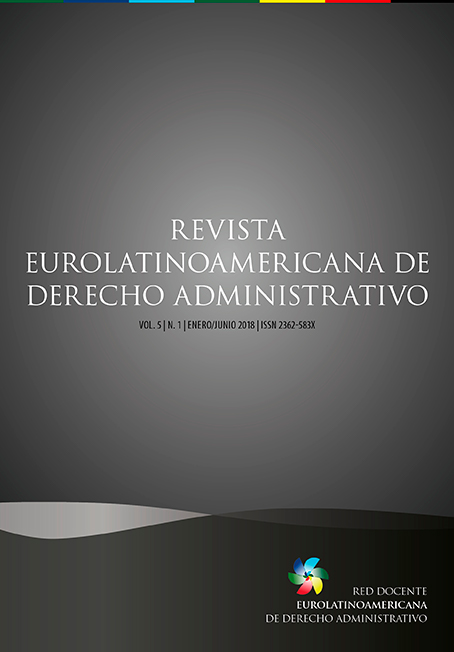Constitution and public policies to eradicate gender-based violence in Spain: from the muses to the theatre
DOI:
https://doi.org/10.14409/redoeda.v5i1.8726Keywords:
gender-based violence, women, human rights, victims, public policies.Abstract
The State Pact on Gender Violence, adopted in 2017 by the Spanish Parliament, contains the thesis ratified by the United Nations that violence against women is an abuse of human rights, reinforcing the status of the victim, by linking their Rights to constitutional values and oblige the State to guarantee them. This article, based on the Spanish normative framework, analyses the structuring instruments of the policies to be developed by he different administrations to determine whether, once the political consensus achieved in the year 2017 State Pact, there is an adequate framework for inter-administrative cooperation to eradicate violence against women.
References
COBACHO LÓPEZ, Ángel. Cuestiones constitucionales de las víctimas en España: Los derechos de las víctimas en España. Toledo: Editorial de Estudios Victimales, 2012.
DECLARACIÓN DE BEIJING. Disponible desde Internet: http://www.juridicas.unam.mx/publica/librev/rev/derhum/cont/55/pr/pr29.pdf
COMISIÓN EUROPEA. Estrategia para la igualdad entre mujeres y hombres 2010-2015. Bruselas. 2010.
GARCÍA RODRÍGUEZ, Manuel José. Una aproximación a las políticas de protección y asistencia a las víctimas de delitos en el contexto europeo. In: TAMARIT SUMALLA, Josep María (Coord.) Estudios de Victimología. Actas del Primer Congreso Español de Victimología. Primera Edición. Valencia: Tirant lo Blanch. 2005.
GOBIERNO DE ESPAÑA, Estrategia Nacional para la erradicación de la violencia contra la mujer 2013-2016. Ministerio de Sanidad, Asuntos Sociales e Igualdad. 2013. Disponible en: http://www.msssi.gob.es/ssi/violenciaGenero/EstrategiaNacional/pdf/EstrategiaNacional.pdf .
GOBIERNO DE ESPAÑA. Documento refundido de medidas del Pacto de Estado en materia de Violencia de Género. Congreso y Senado. Ministerio de Sanidad, Asuntos Sociales e Igualdad. Madrid. 2017. Disponible desde Internet:
http://www.violenciagenero.igualdad.mpr.gob.es/pactoEstado/docs/Documento_refundido_PEVG_.pdf.
KJAERUM, M. La violencia de género es un abuso de derechos humanos. El País. Madrid. 2014.
LOUSADA AROCHENA, José. Aproximación al estatuto de la víctima del delito desde la perspectiva de género. Aequalitas. Aragón, núm 40, p. 12-26, ene. 2017.
OTTENHOF, Reynald, ¿De qué protección disponen actualmente las víctimas? Eguzkilore: Cuaderno del Instituto Vasco de Criminología. País Vasco, núm. 25, 127-133, dic. 2011.
RICO, Nieves. Violencia de género: Un problema de derechos humanos. Serie Mujer y Desarrollo. Comisión Económica para América Latina, 1996. Disponible desde Internet: http://www.eclac.org/publicaciones/xml/5/4345/lcl957e.pdf.
ROJAS JUAREZ, José Rafael. La igualdad efectiva entre mujeres y hombres. Seguridad y Ciudadanía, Revista del Ministerio del Interior. Bilbao, núm. 7/8, p. 127-179, ene/dic. 2012.
RUIZ GONZÁLEZ, José Gabriel. La protección de las víctimas del terrorismo en España: hacia un modelo de atención integral. Nova et Vétera, Bogotá, vol. 22, núm. 66, p. 39-50. 2013.
VILLACAMPA ESTIARTE, Carolina. Pacto de estado en materia de violencia de género: ¿más de lo mismo? Revista Electrónica de Ciencia Penal y Criminología, Granada, núm. 20-04, p. 1-38, ene. 2018.
Downloads
Published
How to Cite
Issue
Section
License
Authors who publish in this Journal agree to the following terms:
- Authors retain copyright and grant the Journal of Constitutional Research the right of first publication with the article simultaneously licensed under the Creative Commons - Attribution 4.0 International which allows sharing the work with recognition of the authors and its initial publication in this Journal.
- Authors are able to take on additional contracts separately, for non-exclusive distribution of the version of the paper published in this Journal (eg.: publishing in institutional repository or as a book), with a recognition of its initial publication in this Journal.
- Authors are allowed and encouraged to publish their work online (eg.: in institutional repositories or on their personal website) at any point before or during the submission process, as it can lead to productive exchanges, as well as increase the impact and the citation of the published work (see the Effect of Open Access).



























.png)





